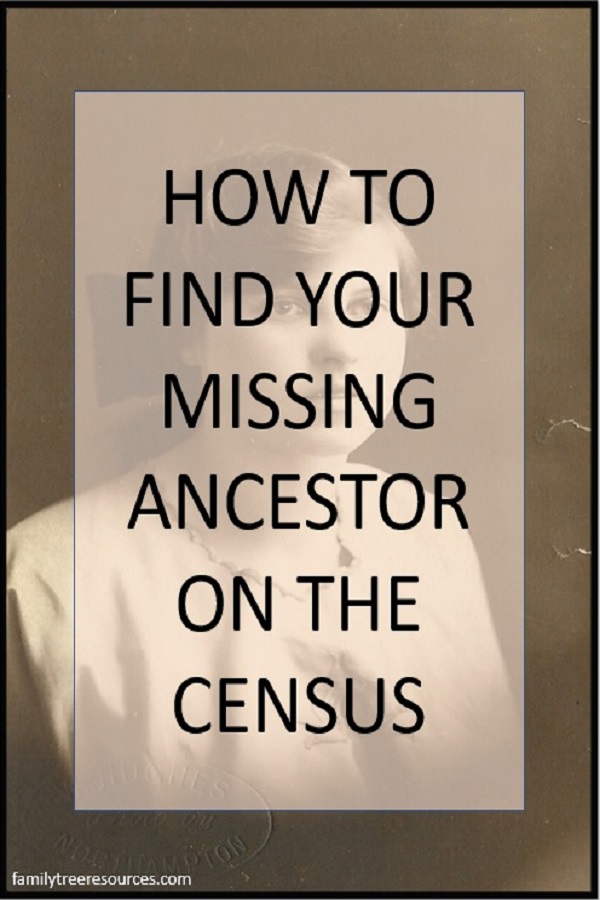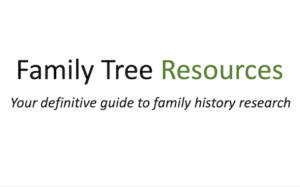
The census can be one of the most helpful records to assist you with your family history research, but there will undoubtedly be an occasion where you simply cannot find your ancestor in the census.
There are many reasons why this may have been the case, which I discuss in detail below, along with tips that may help you to track your ancestor down.
If you cannot find your ancestor in the census, you should look at neighbouring households – you may find that some of the family were living in a neighbouring house, or that the family occupied more than one house in the same street.
I found this to be the case when I was looking for the Dunkley family in Roade, Northamptonshire in 1851.
It was not uncommon for married children to live in the same street as their parents, and some grandchildren lived with their grandparents.
If the children living with the grandparents have a different surname, it may help you to track down a daughter’s marriage because you will then know the surname of the other party.
If you are still unable to find the child’s mother or father on the census, it may hint that an event had occurred, such as the death of the child’s parents, the children being left in their grandparents’ care.
Was your Ancestor Visiting Friends or Family?
You may find that your ancestor was visiting friends or family on the night of the census. If a daughter, for example, had recently had a baby, you find that the mother had moved to be with the daughter to help her to look after the child during its first few days or weeks.
It may be prudent, under these circumstances, to check for other known relatives on the census. You may find that your missing ancestor is with them.
Was a family member in an Institution?
When looking at census returns, you could find your ancestor had been placed in an ‘institution’, which was usually an establishment large enough to hold approximately 200 people such as a prison, workhouse, barracks or hospital.
For example Weedon Barracks in Northamptonshire was listed separately to Weedon village.
This meant the establishment was large enough to be classed as an enumeration district by itself. The inmates of the institution were listed, but sometimes only the initials of the inmates was noted.
The people who worked in the establishment were also noted. The institution was usually put at the end of an enumeration district.
Possible Army connection?
If there is a different place of birth for every child on census returns, and one of those places was an army town such as Woolwich or Aldershot, it may be worth considering that the father may have been, or could still be, in the army and had been posted around the country, staying in different barracks.
Of course, it could just mean the father had had to move away from his home parish in order to find work.
Was your Ancestor a Servant?
If your ancestor worked as a domestic servant, you may find that they lived-in with their employer, so were not enumerated with their family.
Your Ancestor May Have Been in Prison
Another possibility when you have failed to locate your ancestor in the Census is that he may have been in prison.
Your Ancestor May Have Remarried
If the person you are seeking is a woman, it is entirely possible that if she were single that she may have married by the time of the census, and if she were already married, her husband may have died and she had remarried.
If you found your ancestor in 1851, but she was gone by 1861, this may help you to track down a marriage date or death date.
If your ancestor was married by the time of the 1851 Census and had had children, which you cannot locate, it may be that because the mother had remarried that the children had been wrongly transcribed with the new husband’s surname.
Other possibilities are that the children had taken on the new husband’s name, or had been wrongly indexed under the new husband’s name when that was not the case. Under these circumstances, it is best to search using just a first name, age and place of birth. Another option is to search for the children in the aforementioned way, but adding the christian name of the mother to the search.
If the children had taken on the new husband’s name, they may have decided to revert back to their father’s name in later life, so if you cannot find the children in later census returns, such as 1881 or 1891, it is prudent to check under both surnames just in case, and to also bear this in mind when looking for any possible marriage for the children.
You Ancestor May Have Used His Middle Name
It was not uncommon for a person christened under the name of John George to be known as George, so if you are unable to find your ancestor, and he had two names, it may be prudent to look for him under his middle name just in case.
It could also be that your ancestors changed their names around, for example, Alice Nora became known as Nora Alice.
Your Ancestor May Have Died
If your ancestor has disappeared from the Census, (for example, he was there in 1881 but gone in 1891) he may have died, which could help you to narrow down a date of death, so you can search through burial and death records.
Was a Transcription Error made by the Enumerator?
The enumerator sometimes misinterpreted the head of the household’s writing or had to complete the census himself if members of the household were illiterate, so mistakes could have been made in the census entry.
It was also not unheard of for him to mishear the information he was given, so recorded this information incorrectly on the schedule.
Writing Not Always Easy to Read
You may find some census returns are not easy to read because the writing could have faded over time, especially if the original census was written in pencil.
Some pages are so faint they are unreadable on film or online, but don’t give up hope – these pages may be rescanned from the original pages in future.
Was your Ancestor’s Name Spelt Differently?
You may find the spelling of a surname changed over the years, e.g. Falkner, Faulkner, Faulkener, Faulkner etc. To determine if this is the case, you should use a wildcard search to pick up any changes of name, such as Fa*lk*er will bring up all variants in the spelling of Faulkner.
It is also possible to search using a soundex, which will bring up all names that are spelt the way that the name sounds.
If you still draw a blank, one other option is to search using just a first name and place of birth, which will bring up all the people who have that name and who were born in that place.
One word of warning, however – this may take a long time to go through – I have used this method in the past, and found I had to go through thousands of entries in the index!!!
Your ancestor may have only given his initial to the census enumerator, rather than his full name, so if all else has failed, you could try searching for him using simply his initial, to see if you can then find him.
Some of the Census is Missing
Some portions of the Census Returns from 1841 to 1911 have been lost over the years, so it may be that your ancestor was living at an address contained in one these missing portions. The most missing pages are from the 1861 Census.
It is possible peruse a full list of the missing portions from all the Census Returns.
1911 Census Protest – No Vote, No Census
If you are perusing the 1911 Census, and cannot find your ancestor, it is worth bearing in mind that many Suffragettes boycotted the Census, writing ‘no vote, no census’ across the Census Schedule. Some women wrote ‘I don’t count so I won’t be counted’, and ‘as I am a woman and women do not count in the state, I refuse to be counted. Rebellion against tyrants is obedience to God’.
Many women hid from the enumerators or attempted to confuse them by moving from address to address. Emily Davison, who died in 1913 when she threw herself in front of a horse at the Epsom Derby, hid in the Houses of Parliament during the time the 1911 Census was taken so that she could state that the Palace of Westminster was where she lived.
Emily was duly noted on the census form as ‘found hiding in the Crypt of Westminster Hall, Westminster’. It is ironic that Emily was actually recorded in the census twice because her landlady noted her as living in Coram Street.
If the women refused to answer the enumerator’s questions, he may have asked the neighbour to give him information regarding the family living in that house, but any information provided by the neighbour may have been inaccurate.
Alternatives to Census Returns
If you have tried all the tips I have mentioned in this page, but still cannot find your ancestor, it is also worth looking at street directories or trade directories. You may find that your ancestor had a trade, and he is listed in the directory, along with his address, so you can search by street address in the census instead of by name.
It is also worth looking at electoral rolls to see if you can find your ancestor, but these are not indexed, so you do need to have some idea of your ancestor’s address.
